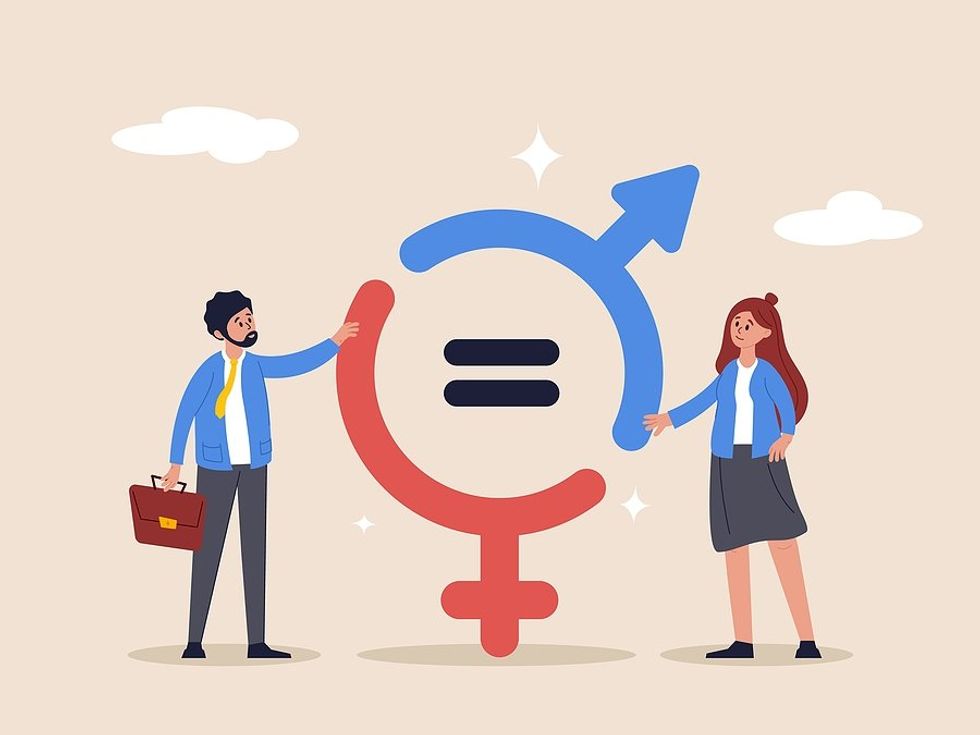As businesses strive to create environments that foster diversity, inclusivity, and fairness, the imperative to understand and implement effective strategies for promoting gender equality in the workplace has never been more pressing. A workplace that promotes gender equality is a workplace where innovation and productivity flourish, driving long-term organizational success. What practical strategies can leaders implement to help create an inclusive and equitable work environment where everyone can thrive?
We recently asked our leading executives for their best tips on how to promote gender equality in the workplace.
Here are their responses...
Michael Willis, Sports Business Operations Executive
No more playing it safe with surface-level initiatives or empty gestures. It's time to unleash a storm of innovation and redefine what it means to truly champion gender equality in every corner of the professional realm.
Step 1: Shatter the Status Quo - Throw out those old-school gender roles and expectations. Men in leadership and nurturing roles? Absolutely. Women in traditionally male-dominated industries? You bet. Let's obliterate the barriers that have held us back for too long.
Step 2: Pay Parity or Bust - No more excuses. Audit those payrolls and fix the wage gap pronto. It's time to show that the value of your work has nothing to do with gender. Pay up or prepare to face some significant disruption.
Step 3: Fierce Flexibility - Flextime isn't just for show—it's for real. Allow everyone to craft their schedules around their lives. Parent-teacher meetings, gym time, creative pursuits—let's blend work and life in a way that makes sense for everyone.
Step 4: Gender-Blind Hiring - Resumes with no names, no gender indicators—just skills and experience. It's time to pick talent based on capability, not gender assumptions.
Step 5: Parental Leave for All - Parental leave that doesn't discriminate. Dads, moms, adoptive parents—everyone gets a chance to bond and support their families without fearing career repercussions.
Step 6: Mandatory Unconscious Bias Training - Nobody escapes this. Everyone, from the CEO to the intern, gets a reality check on their biases. It's time to level the playing field by leveling the mindset.
Step 7: Leadership Overhaul - Time to rewrite the leadership narrative. Promote women not just because it's trendy but because they're qualified. We need diverse voices at the top calling the shots.
Step 8: Transparency Talk - Publish diversity and inclusion data. Let everyone see precisely where your workplace stands.
Step 9: Speak Out, Stand Up - Foster an environment where calling out inequality isn't risky business. Encourage employees to speak up and back them up when they do.
Step 10: Disruptive Mentorship - Pair rising stars with seasoned pros from all walks of life. Gender, age, industry—mix it up. The wisdom doesn't just flow one way.
Step 11: Men as Allies - Men, it's time to join the fight for gender equality. Amplify women's voices, challenge the system, and acknowledge that when one of us rises, we all do.
Step 12: Fearless Flexing - Embrace employees who challenge the norms. Please encourage them to break boundaries and create initiatives that amplify gender equality like never before.
So, there you have it—a disruptive approach to gender equality in the workplace. It's time to shake things up, challenge the norms, and make equality more than just a buzzword. Let's create a workplace where everyone thrives, regardless of gender, because we're in this together for real change.
Michael Willis has 18+ years of experience working with accounting & sports organizations and has managed P&Ls of $10M - $125M+ with budgets of $3M-$50M+. He worked for the NFL for 22 1/2 years, mainly with the game officials working on the financial/accounting side of the business.
Kathryn Marshburn, Artist & Label Partnerships

Image from Bigstock
The music industry has experienced gender inequality for decades where women are still vastly under-represented. We have an outrageous gender gap that is improving but at a nominal rate and we need more equity leadership from all music entities.
Thirty percent of music artists identify as females on the Billboard Hot 100 today. Basically, this means that there are 3.5 men for every 1 woman represented in the music industry. We have to correct this inequity, but the question is how?
The runway for men from the top 100 position to the top 20 position is much easier than the mapping of females to a top 20 position. It is painfully obvious that it is harder for women to break into music and to make it into the top where 70% of men are making the breakthrough over a longer runaway. Women are expected to go straight to the top quickly and it’s just not realistic or fair.
What are the solutions to consider?
1. Music label initiatives to sign and seek more female artists, providing better budgets to support music production and distribution.
2. Rip the Band-Aid off the issue exposing the narrative about the inequities in the industry that exist with a lack of female music engineers, music, executives, and other parallel roles within the music industry. Provide opportunities to speak on the issue and to amplify the need to have better equality.
3. Demand that streaming platforms support marketing campaigns that feature women. An amazing example of this is the EQUAL campaign at Spotify, where major marketing dollars are put to the test behind international female artists, virtually unknown music artists, that include worldwide promotions such as Times Square billboards, live events, and other marketing activations. Spotify has successfully provided support for female music artists to tell their stories through music and increased fanbase growth and overall support of women in music.
4. Providing an educational track at the elementary school level encouraging more music programs targeted at females including writing, composing, and vocal training.
5. Become more transparent about pay inequity, and close the gap.
6. Move from a mentorship mentality to a sponsorship mindset.
With a huge gap in gender within the music industry, we must become better advocates for women and female artists.
The industry has always been difficult to break through, but it’s particularly harder for women who are struggling to map their journey through unfair territory. Please leave comments and thoughts and help us to create a more equitable environment in the music.
Kathryn Marshburn has spent 12+ years in the music and gaming industries guiding teams on identifying targeted goals with an agile approach resulting in driving revenue and reducing risk.
Lisa Perry, Global Marketing Executive

Image from Bigstock
Gender inequality has been a hot topic of discussion and concern lately. While progress has been made in recent years, there are still areas where gender disparities exist.
- Not a single country in the world has achieved gender equality. On a global level, there’s been little progress on gender equality since the Global Goals were signed in 2015. Source
- Over 380 million women and girls are living in extreme poverty. That’s more than the entire population of the United States living on less than $1.90 a day. Source
- Women shoulder billions of hours of unpaid childcare globally. And the pandemic just made it worse. Source
- Women earn 82% of what men make in the same roles, and this gender gap has remained relatively stable over the past 20 years. Source
- Less than 20% of the world’s landholders are women. Source
- Women make up 10.4% of Fortune 500 CEOs and earn 75% less than their male counterparts. Source
In the face of these staggering statistics, it’s imperative to address gender inequality in all spheres of life, including the workplace. When there is a lack of diversity in decision-making, it eliminates the viewpoint of a huge percentage of the population. So, how can organizations take concrete steps to promote gender equality in the workplace?
- Equal Pay for Equal Work: Ensure men and women are paid equally for the same roles and responsibilities. Regularly review salary structures and address any pay disparities.
- Inclusive Hiring Practices: Implement unbiased and inclusive hiring practices that ensure equal opportunities for all candidates, regardless of gender. Use diverse hiring panels and consider blind recruitment techniques.
- Flexible Work Policies: Offer flexible work arrangements that cater to the diverse needs of employees, particularly women who often juggle work and caregiving responsibilities.
- Leadership Development: Develop programs that actively identify and nurture female talent within the organization. Encourage women to take on leadership roles and provide them with mentorship and guidance.
- Education and Training: Conduct gender sensitivity training for all employees to create awareness about unconscious biases and stereotypes in the workplace.
- Family-Friendly Policies: Provide comprehensive family-friendly policies, including parental leave, childcare facilities, and support for caregivers, to ensure a conducive environment for both men and women to balance work and family responsibilities.
- Transparent Promotion Criteria: Clearly define and communicate promotion criteria to ensure that opportunities for growth and advancement are available to all employees based on merit.
Promoting a workplace culture of gender equality empowers organizations to harness their workforce’s full potential, fuel economic growth, and foster inclusivity. Embracing gender equality nurtures an environment where every voice matters, bolstering employee satisfaction and retention. Beyond a moral duty, it’s an investment in the future of organizations and societies, propelling progress.
For a step-by-step guide on how to develop a brand strategy, check out my book How to Develop a Brand Strategy.
Lisa Perry helps companies drive revenue by using consumer trends, insights, and data analytics to innovate their approach to marketing.
How do you promote gender equality in the workplace? Join the conversation inside Work It Daily's Executive Program.




